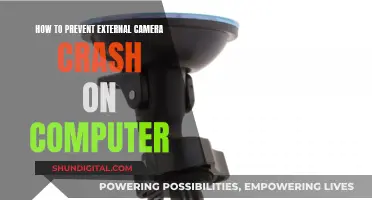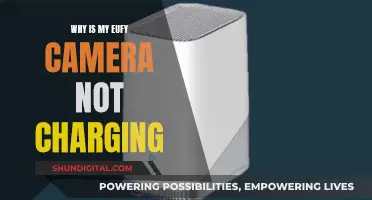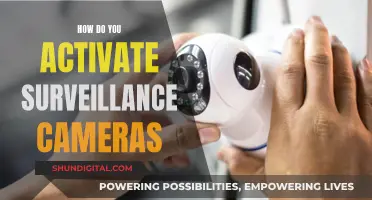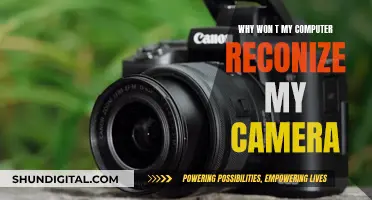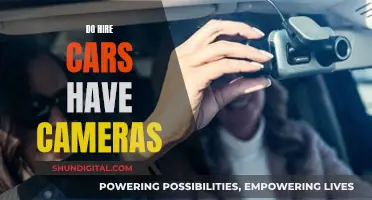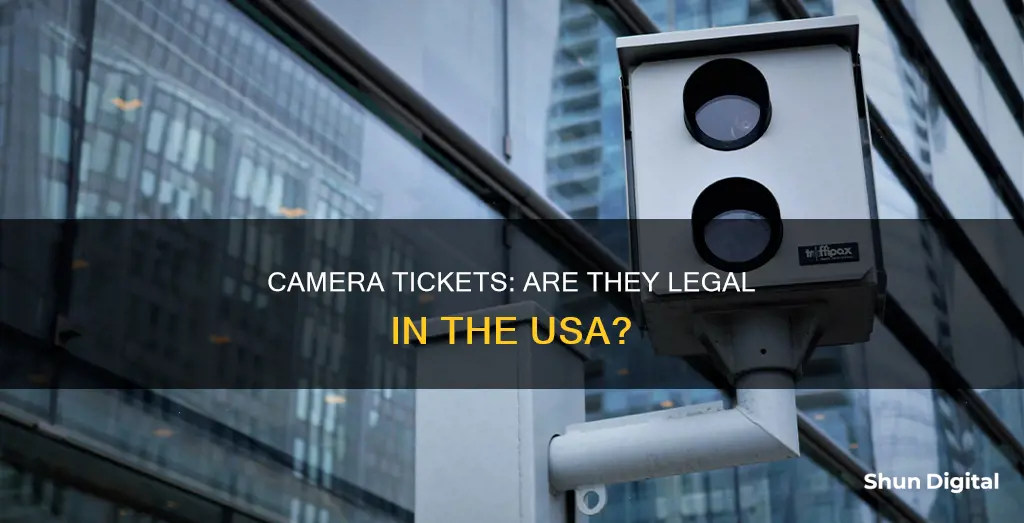
While cameras have been used for a while to catch drivers breaking traffic laws, the use of camera tickets, also known as photo radar, is a more recent development. Camera tickets use automated cameras to detect and ticket vehicles that are breaking the law. The legality of these tickets has been a topic of debate in the United States, with some arguing that they violate the right to due process and others claiming they improve safety. The debate centres on questions of constitutionality, privacy, and effectiveness, with proponents arguing that they improve road safety and detractors claiming they are inaccurate and violate citizens' rights. So, are camera tickets legal?
What You'll Learn

Constitutionality concerns
The use of speed and red-light cameras to enforce traffic laws in the USA is a highly controversial issue, with questions raised about public safety, privacy, and drivers' rights. While these cameras are a revenue stream for governments and some studies show they improve safety, independent studies have shown no gains and, in some cases, worse results.
The use of speed and red-light cameras has been criticised as an intrusion into daily life, with dubious constitutionality. Specifically, the use of these cameras has been said to violate the Sixth Amendment's Confrontation Clause, which grants criminal defendants the right to be confronted with the witnesses against them. Since a camera, not a person, witnesses the offence, these violations are generally treated as civil fines rather than criminal offences. The ticket is issued to the owner of the vehicle, not the person driving it, leaving uncertainty as to the identity of the offender. This can make enforcement and collection difficult, and appeals procedures typically do not give drivers their day in court.
In Missouri, the state Supreme Court ruled that automated traffic enforcement programs are unconstitutional unless the state has proof of the driver's identity at the time of the offence.
The financial incentives for local governments and camera companies to game the system create a conflict of interest and can undermine citizens' faith in the legal system and breed mistrust.
Shipping Camera Batteries: USPS Guidelines and Tips
You may want to see also

Privacy rights
The use of traffic cameras to enforce road safety and issue tickets is a highly controversial practice in the USA. While many states use these cameras, the question of whether they infringe on citizens' privacy rights has been raised.
Traffic enforcement cameras are used to detect and deter speeding, running red lights, toll violations, and other motoring offences. These cameras can be mounted beside or over a road or installed in an enforcement vehicle. They may be linked to an automated ticketing system, which raises concerns about privacy and the potential for mass surveillance of vehicle movements and, by association, the movements of vehicle owners.
The latest automatic number-plate recognition systems can identify the average speeds of vehicles and enable the government to track the movement of vehicles and their owners. While this technology has been proven to reduce accidents and increase road safety, it also raises concerns about the loss of privacy. Some groups, such as the American Civil Liberties Union, claim that the use of speed traps as a revenue source undermines the legitimacy of safety efforts.
In the USA, citizens have a right to privacy, which includes protection from unreasonable searches and seizures. This right is protected by the Fourth Amendment to the US Constitution. While traffic enforcement cameras may be seen as a reasonable way to enforce road safety, some argue that they violate the privacy rights of citizens by collecting and storing data on their movements without their consent.
The Supreme Court has ruled that individuals have a reasonable expectation of privacy in their movements and location, and that prolonged surveillance of their movements without a warrant can violate the Fourth Amendment. However, the Court has also recognised that individuals may have a reduced expectation of privacy in certain public places, such as on public roads.
While there is no definitive answer to whether traffic camera tickets infringe on privacy rights in the USA, it is clear that this is a complex and highly debated issue. Citizens have a right to privacy, but the government also has a responsibility to ensure public safety and enforce traffic laws. As technology advances and the use of traffic cameras becomes more prevalent, it is likely that the debate around privacy rights and traffic enforcement will continue to evolve.
Polaroid OneStep Close-Up: Battery Life Explained
You may want to see also

Effectiveness and safety
The effectiveness and safety of camera tickets are highly debated topics in the United States. Proponents of this method of law enforcement argue that they prevent traffic accidents, while opponents believe that they are primarily used for generating revenue through traffic tickets.
Research studies have examined the safety and effectiveness of red light cameras in preventing accidents, with mixed results. Some studies suggest that red light cameras may cause drivers to stop more abruptly, leading to an increase in rear-end collisions. However, the majority of studies also indicate a reduction in side-impact collisions at intersections.
The Texas Transportation Institute reports that camera tickets have effectively reduced the number of accidents at red-light intersections. However, many drivers remain sceptical about the benefits, believing that the programs are money-making schemes for local municipalities.
The reliability of speed-limit cameras has also been questioned. In cities like New Orleans, drivers have expressed concerns about abrupt changes in speed limits, making it challenging to adjust their speed immediately. This has resulted in speeding tickets even when they were in the process of slowing down.
To address these concerns, some improvements have been suggested, such as relocating speed-detecting cameras further into zones with lower speed limits or implementing human review of footage before issuing tickets.
While camera tickets have their supporters and detractors, the primary goal is to improve road safety and reduce accidents. The effectiveness and safety of these systems are continually evaluated, and adjustments are made to strike a balance between enforcing traffic laws and ensuring fairness for drivers.
Eufy Camera Battery Replacement: A Step-by-Step Guide
You may want to see also

Revenue generation
The use of camera tickets in the USA is a highly controversial topic, with many states implementing them to enforce traffic laws. While the primary purpose of these cameras is to improve road safety, they have also become a significant source of revenue generation for local governments and private companies.
In terms of revenue generation, the use of camera tickets has led to substantial financial gains for local authorities and private companies involved in their operation. For example, in Chicago, red-light cameras generated around $67 million in revenue in 2016, a 50% increase since 2014. This revenue is shared between the city where the camera is installed and the private company operating the cameras, creating an incentive for both parties to maximise the number of tickets issued.
Private companies that provide red-light camera technology have been criticised for prioritising profits over public safety. For instance, American Traffic Solutions, Inc. (ATS), an Arizona-based company, retains up to 86% of the profit from its red-light cameras, while the municipalities they supply struggle to break even. Similarly, Redflex Traffic Systems, a Phoenix-based company, has been at the centre of controversies, including a scandal in Chicago involving bribery of city officials and false reporting of violations in North Carolina.
The use of camera tickets has also been scrutinised due to concerns over timeliness, fairness, privacy issues, and effectiveness. Critics argue that these cameras are more about generating revenue than improving road safety, as evidenced by the small percentage of funds received by municipalities compared to private companies. Additionally, studies suggest that while there may be a decrease in certain types of accidents, there is an overall increase in accidents resulting in injuries, casting doubt on the effectiveness of these measures.
Furthermore, the high cost of implementing this technology has been questioned, especially during challenging economic times, as the relatively low incidence of traffic violations in certain areas does not justify the expense. There is also scepticism regarding the transparency of revenue generation and its utilisation, with calls for more detailed information on the funds raised and their allocation.
In conclusion, while the use of camera tickets in the USA has led to significant revenue generation for local governments and private companies, it has also sparked controversies surrounding fairness, privacy, and effectiveness. The primary motivation of improving road safety seems to have been overshadowed by the financial incentives, leading to a growing distrust among the public and calls for increased transparency and accountability.
Fixing Blurry Selfies: Camera Focus Issues and Solutions
You may want to see also

Due process and fairness
The use of camera tickets in the USA is a highly controversial topic, with many states enacting legislation to permit, limit, or prohibit their use. One of the main concerns surrounding this issue is due process and fairness.
Camera tickets, or automated enforcement, raise questions about public safety, privacy, and drivers' rights. Critics argue that the use of cameras infringes on civil liberties and that there is a lack of oversight in the programs. In some cases, it has been found that tickets were issued even when vehicles could not be conclusively identified, raising concerns about the accuracy and fairness of the system.
One of the basic legal issues related to due process is driver identification. In some jurisdictions, the registered owner of the vehicle is issued the ticket regardless of who was driving. This raises concerns as the registered owner may not have been the actual driver and is held fully responsible without any evidence.
When a police officer physically issues a ticket, the driver has the opportunity to question the officer about the evidence at the time of the incident and again in court. This option is not available with automatically generated tickets, and equipment failures and ambiguous results are common.
However, advocates of camera tickets argue that they serve as an effective tool for enforcing laws and improving safety. In some cases, it has been found that traffic camera tickets reduced the number of red-light violations at monitored intersections.
The legality of traffic camera tickets has been addressed in several court cases, with mixed rulings. For example, in People v. Kao, the California Supreme Court upheld the use of automated traffic enforcement as constitutional, while in State v. Brown, the Ohio Supreme Court ruled that traffic camera tickets must be issued by a law enforcement officer to be valid.
As the debate over the legality of camera tickets continues, it is important for drivers and vehicle owners to understand their rights and the issues at stake. Local and federal courts are keeping a close watch, and motorists have successfully challenged camera citations on the basis of due process violations.
Overcharging Camera Batteries: Good, Bad, or Indifferent?
You may want to see also
Frequently asked questions
The use of camera tickets varies across the USA. While some states prohibit the use of automated cameras to catch traffic violators, others allow them with certain restrictions.
As of May 2024, 19 states and the District of Columbia have passed laws permitting the use of speed cameras. These include Alabama, Arizona, California, Colorado, Connecticut, Delaware, Florida, Georgia, Hawaii, Illinois, Indiana, Iowa, Louisiana, Missouri, New York, North Carolina, Ohio, Oregon, Pennsylvania, Rhode Island, Tennessee, Texas, Utah, Virginia, Washington, Wisconsin, and Wyoming.
As of May 2024, 9 states have passed laws prohibiting the use of speed cameras. These include Arkansas, Maine, Mississippi, Montana, Nevada, New Hampshire, New Mexico, South Dakota, Texas, Utah, West Virginia, and Wisconsin.
The use of camera tickets is often restricted to certain areas, such as school or work zones. Some states also require that signs be posted to inform drivers of the presence of cameras. Additionally, some states mandate that traffic violation cameras be operated and maintained by law enforcement.
The use of red light and speed cameras has been shown to reduce crashes. These cameras can also help enforce traffic signals and speed limits, improving road safety.


